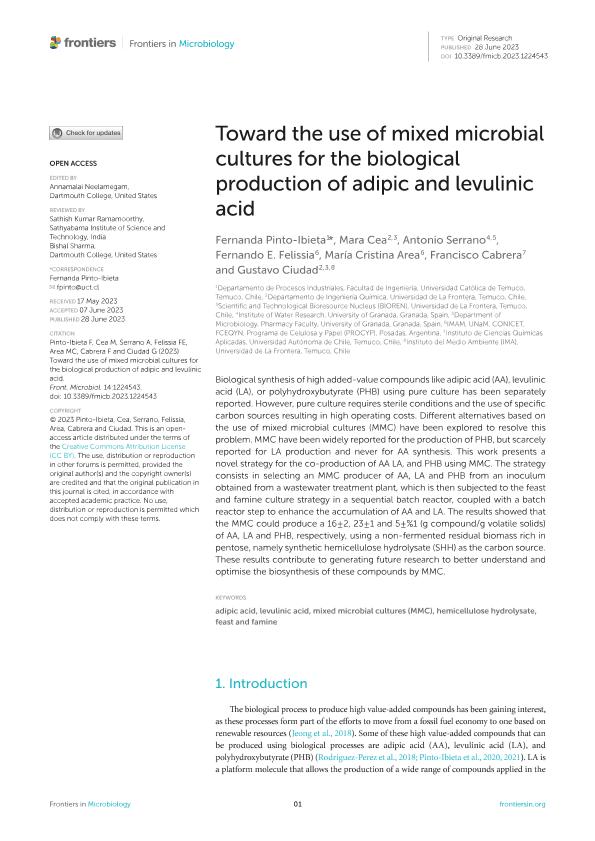Mostrar el registro sencillo del ítem
dc.contributor.author
Pinto Ibieta, Fernanda
dc.contributor.author
Cea, Mara
dc.contributor.author
Serrano, Antonio
dc.contributor.author
Felissia, Fernando Esteban

dc.contributor.author
Area, Maria Cristina

dc.contributor.author
Cabrera, Francisco
dc.contributor.author
Ciudad, Gustavo
dc.date.available
2024-01-15T18:04:47Z
dc.date.issued
2023-06
dc.identifier.citation
Pinto Ibieta, Fernanda; Cea, Mara; Serrano, Antonio; Felissia, Fernando Esteban; Area, Maria Cristina; et al.; Toward the use of mixed microbial cultures for the biological production of adipic and levulinic acid; Frontiers Media; Frontiers in Microbiology; 14; 6-2023; 1-8
dc.identifier.uri
http://hdl.handle.net/11336/223661
dc.description.abstract
Biological synthesis of high added-value compounds like adipic acid (AA), levulinic acid (LA), or polyhydroxybutyrate (PHB) using pure culture has been separately reported. However, pure culture requires sterile conditions and the use of specific carbon sources resulting in high operating costs. Different alternatives based on the use of mixed microbial cultures (MMC) have been explored to resolve this problem. MMC have been widely reported for the production of PHB, but scarcely reported for LA production and never for AA synthesis. This work presents a novel strategy for the co-production of AA LA, and PHB using MMC. The strategy consists in selecting an MMC producer of AA, LA and PHB from an inoculum obtained from a wastewater treatment plant, which is then subjected to the feast and famine culture strategy in a sequential batch reactor, coupled with a batch reactor step to enhance the accumulation of AA and LA. The results showed that the MMC could produce a 16 ± 2, 23 ± 1 and 5 ± %1 (g compound/g volatile solids) of AA, LA and PHB, respectively, using a non-fermented residual biomass rich in pentose, namely synthetic hemicellulose hydrolysate (SHH) as the carbon source. These results contribute to generating future research to better understand and optimise the biosynthesis of these compounds by MMC.
dc.format
application/pdf
dc.language.iso
eng
dc.publisher
Frontiers Media

dc.rights
info:eu-repo/semantics/openAccess
dc.rights.uri
https://creativecommons.org/licenses/by/2.5/ar/
dc.subject
ADIPIC ACID
dc.subject
FEAST AND FAMINE
dc.subject
HEMICELLULOSE HYDROLYSATE
dc.subject
LEVULINIC ACID
dc.subject
MIXED MICROBIAL CULTURES (MMC)
dc.subject.classification
Bioproductos, Biomateriales, Bioplásticos, Biocombustibles, Bioderivados, etc.

dc.subject.classification
Biotecnología Industrial

dc.subject.classification
INGENIERÍAS Y TECNOLOGÍAS

dc.title
Toward the use of mixed microbial cultures for the biological production of adipic and levulinic acid
dc.type
info:eu-repo/semantics/article
dc.type
info:ar-repo/semantics/artículo
dc.type
info:eu-repo/semantics/publishedVersion
dc.date.updated
2024-01-11T14:32:33Z
dc.identifier.eissn
1664-302X
dc.journal.volume
14
dc.journal.pagination
1-8
dc.journal.pais
Suiza

dc.description.fil
Fil: Pinto Ibieta, Fernanda. Universidad Católica de Temuco; Chile
dc.description.fil
Fil: Cea, Mara. Universidad de La Frontera; Chile
dc.description.fil
Fil: Serrano, Antonio. Universidad de Granada; España
dc.description.fil
Fil: Felissia, Fernando Esteban. Consejo Nacional de Investigaciones Científicas y Técnicas. Centro Científico Tecnológico Conicet - Nordeste. Instituto de Materiales de Misiones. Universidad Nacional de Misiones. Facultad de Ciencias Exactas, Químicas y Naturales. Instituto de Materiales de Misiones; Argentina
dc.description.fil
Fil: Area, Maria Cristina. Consejo Nacional de Investigaciones Científicas y Técnicas. Centro Científico Tecnológico Conicet - Nordeste. Instituto de Materiales de Misiones. Universidad Nacional de Misiones. Facultad de Ciencias Exactas, Químicas y Naturales. Instituto de Materiales de Misiones; Argentina
dc.description.fil
Fil: Cabrera, Francisco. Universidad Autónoma de Chile; Chile
dc.description.fil
Fil: Ciudad, Gustavo. Universidad de La Frontera; Chile
dc.journal.title
Frontiers in Microbiology
dc.relation.alternativeid
info:eu-repo/semantics/altIdentifier/url/https://www.frontiersin.org/articles/10.3389/fmicb.2023.1224543/full
dc.relation.alternativeid
info:eu-repo/semantics/altIdentifier/doi/http://dx.doi.org/10.3389/fmicb.2023.1224543
Archivos asociados
